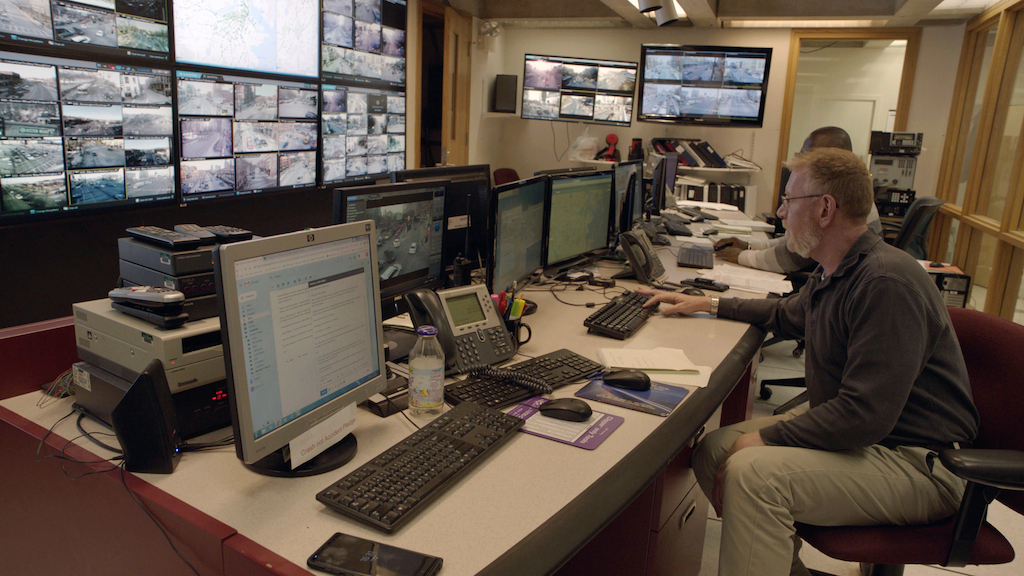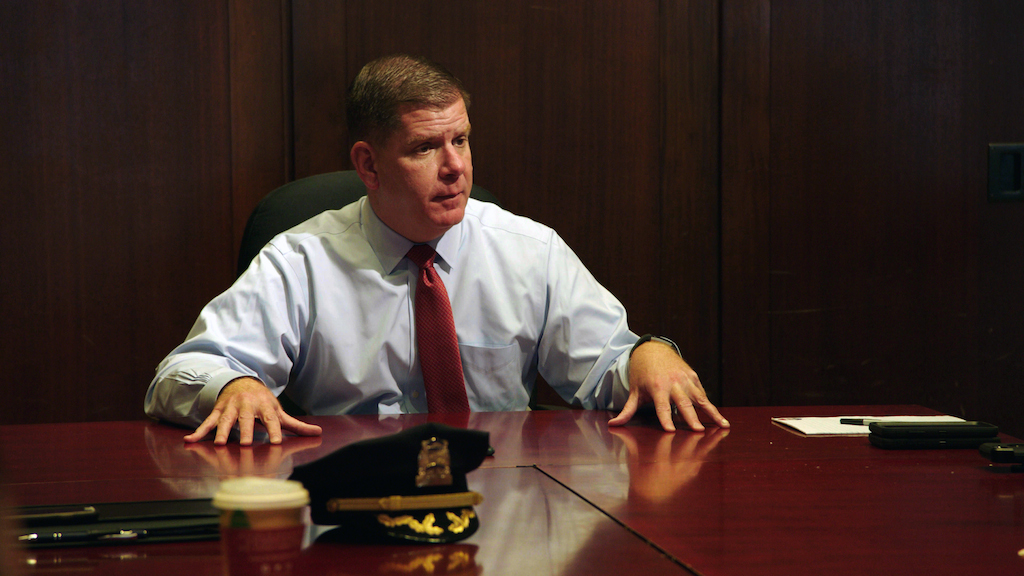
Here’s a surreal thought that hit me recently: I have not been to Boston in over six months.
This is not to say that I’m one of those who fled the city in light of the pandemic. Quite the opposite, in fact: as someone fortunate enough to have a day job that allows me to work from home, but not fortunate enough to own a car, I have been more or less tethered to my cozy Somerville triple-decker. I’ve managed to take a couple of mini-vacations to rural climes, and I’ve made one daring trip over the border to Cambridge, but Boston, the city whose name tops this website and with which I’ve so long associated, has remained remote. On the eve of the shutdowns in March, sensing a storm brewing, I took a detour to the North End on my way home from work, stocked up on coffee beans from Polcari’s, and took the Orange Line home. Since then, for me, Boston might as well be Los Angeles.
I felt this absence acutely while watching City Hall, the latest sprawling opus from the endlessly prolific documentarian (and noted Cantabridgian) Frederick Wiseman. At its core, City Hall is a fly-on-the-wall glimpse into local Beantown politics, following the mayor as he navigates wealth inequality and racial justice in a series of meetings and public functions. But (thankfully) this is more than just the Marty Walsh show. Instead, Wiseman uses Walsh and other city employees as an entry point to train his famously nonjudgmental camera on modern city life in general, and minority communities in particular. Deciding to watch City Hall is an investment, to be sure, but it’s a rewarding one.
To the uninitiated, Wiseman’s work can be daunting, to say the least. Since his explosive and controversial 1967 directorial debut Titicut Follies, the 90-year-old filmmaker has turned out documentary features at an astonishing clip, directing 46 films in 53 years, mostly with austere titles like High School and Boxing Gym. What’s more, his later work has been increasingly lengthy, with City Hall tipping the scales at a truly massive 272 minutes. It’s understandable why some cinephiles are too intimidated to take the plunge; from the outset, Frederick Wiseman would appear to be the black diamond slope of documentary film.
But this reputation belies how fundamentally watchable and engaging Wiseman’s films are. I took a full day off to watch City Hall, and while I’m glad I had sufficient snacks handy, I was almost never bored. Part of this is due to Wiseman’s smart decision to structure his film episodically: each scene is self-contained, introducing new citizens illustrating a different aspect of modern life. These range from the mundane (an elderly man calling animal control to take care of his rat problem) to the profoundly complex (a public community meeting about an Asian-American-owned weed dispensary opening in a poor neighborhood in Dorchester) to the fascinating and surprising (a visit with some archaeologists in the city archives). Interspersed are a few “quick takes,” such as an audio collage of questions and answers recorded in the city hall lobby, or a montage of x-rayed backpacks from the security checkpoint. Each tableau presents its own unique perspective on what it’s like to live in Boston, and plays out at its own pace.

Wiseman shoots in the “direct cinema” style pioneered in the ‘60s by the likes of D.A. Pennebaker and the Maysles brothers, an extreme form of cinema verite in which the director is rendered invisible and no non-diegetic flourishes are introduced. This approach can be a bit jarring to moviegoers raised on the deliberately addictive narratives of Netflix or the in-your-face polemics of Michael Moore. But this is not to say that his films are unstructured, or that the director’s voice cannot be heard. Rather, the camera takes the place of Wiseman’s eye, and the scenes are shaped by his perceptions. The human mind, particularly in the age of mass media, is adept at shaping input into stories, but rarely does so in real time. What Wiseman does is mold his footage to reflect the scenes as he sees them. The results are sometimes funny (such as a scene in which Walsh delivers a sober speech about social disparities at the Greater Boston Food Bank while flanked by Wally the Big Green Monster), and occasionally tricky to follow for those not fluent in politic-speak. But Wiseman keeps your attention, taking you on one quietly profound journey after another.
If City Hall has a flaw, it’s the man at its center. As you likely don’t need me to tell you, Marty Walsh is a tremendously uninteresting figure, the kind of blandly democratic politician who rarely says anything too objectionable, while just as rarely doing anything inspiring. He has none of the spark or passion that could turn him into the star of the show, as James Carville did in Pennebaker’s The War Room (or, to use a more recent example, Alexandra Ocasio-Cortez in Knock Down the House); the closest we see to this sort of charisma is a brief scene in which Ed Markey dances with a young man with Downs syndrome at a Thanksgiving charity race. There are some who might fault Wiseman for not probing more deeply into Walsh’s doublespeak, championing Boston’s minority populations while also paving the way for luxury condos (though there is some of that; in a mordantly funny scene worthy of Christopher Guest, the foreman at a condo construction site gazes out the window and muses, “It’s not a bad view… until that building there gets built”). But again, Wiseman isn’t really interested in Walsh (can you blame him?). Instead, he uses him as a vehicle to get to the actual characters: the proprietor of the international America’s Food Basket in Mattapan, the differently-abled activists petitioning for new ramps at the BPL, the young, Black, Muslim woman trying to figure out how, exactly, her community’s voices will be communicated from a town hall meeting to the actual town hall.

Yet, remarkably, some of the parts that transfixed me the most were not the impassioned speeches, but the wordless interstitials in which Wiseman trains his camera on the truly mundane. A garbage truck ingests a pile of trash bags, then a box spring, then a steel outdoor grill; street workers lay down the (surprisingly complex!) red coloration on a crosswalk in Allston; montage after montage of locally owned bodegas and nail salons. These are things that, until six months ago, I walked by every day without giving a second thought. Yet, by stopping us in our tracks and forcing us to watch the entire process, Wiseman shows us the beauty in the banal, like a slow-motion Koyaanisqatsi. Maybe it’s just that I haven’t gotten out much in a while, but even simple things like the sound of the 66 belching out passengers at the corner of Cambridge Ave. and Brighton take on a strange sense of wonder.
To be a “proud Bostonian” is to acknowledge its many contradictions and flaws. It’s a city renowned for its intellectuals and progressive politics, yet it has a long history of flagrant, deeply rooted racism. It’s located in a doggedly blue state which inexplicably continues to both elect and adore Republican governors. It’s home to some of the greatest and most revered rock bands of the twentieth century, yet is most commonly associated in the public eye with Aerosmith. Yet the people who call it home are intensely loyal to their shitty little city (I’m reminded, as I often am, of Jimmie Fails’ great line about his hometown in The Last Black Man in San Francisco: “You’re not allowed to hate it if you don’t love it”). More than most films I’ve seen, City Hall gets that, and it allows beams of hope to shine out from between the warts. Boston’s not perfect, but it’s still a special little town. Someday, I hope to return to it.
City Hall
2020
dir. Frederick Wiseman
272 min.
Screens virtually 9/25-9/30 at the New York Film Festival – click here to follow our continuing festival coverage!
Right now Boston’s most beloved theaters need your help to survive. If you have the means, the Hassle strongly recommends making a donation, purchasing a gift card, or becoming a member at the Brattle Theatre, Coolidge Corner Theatre, and/or the Somerville Theatre. Keep film alive, y’all.

